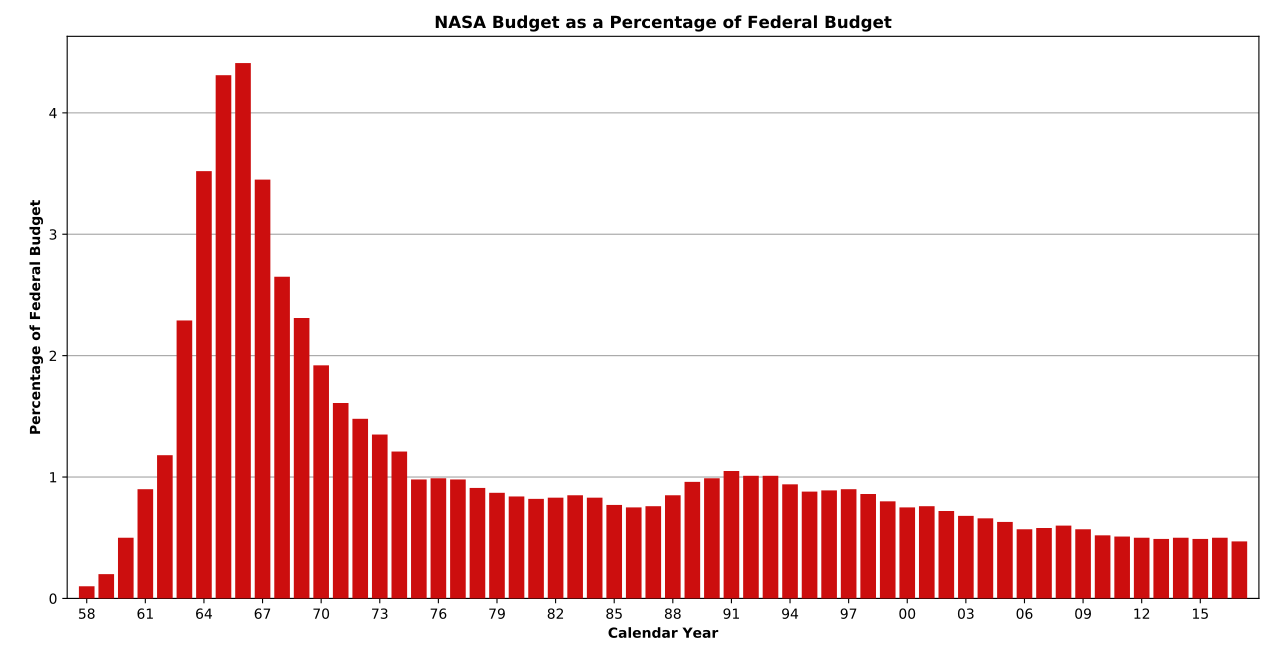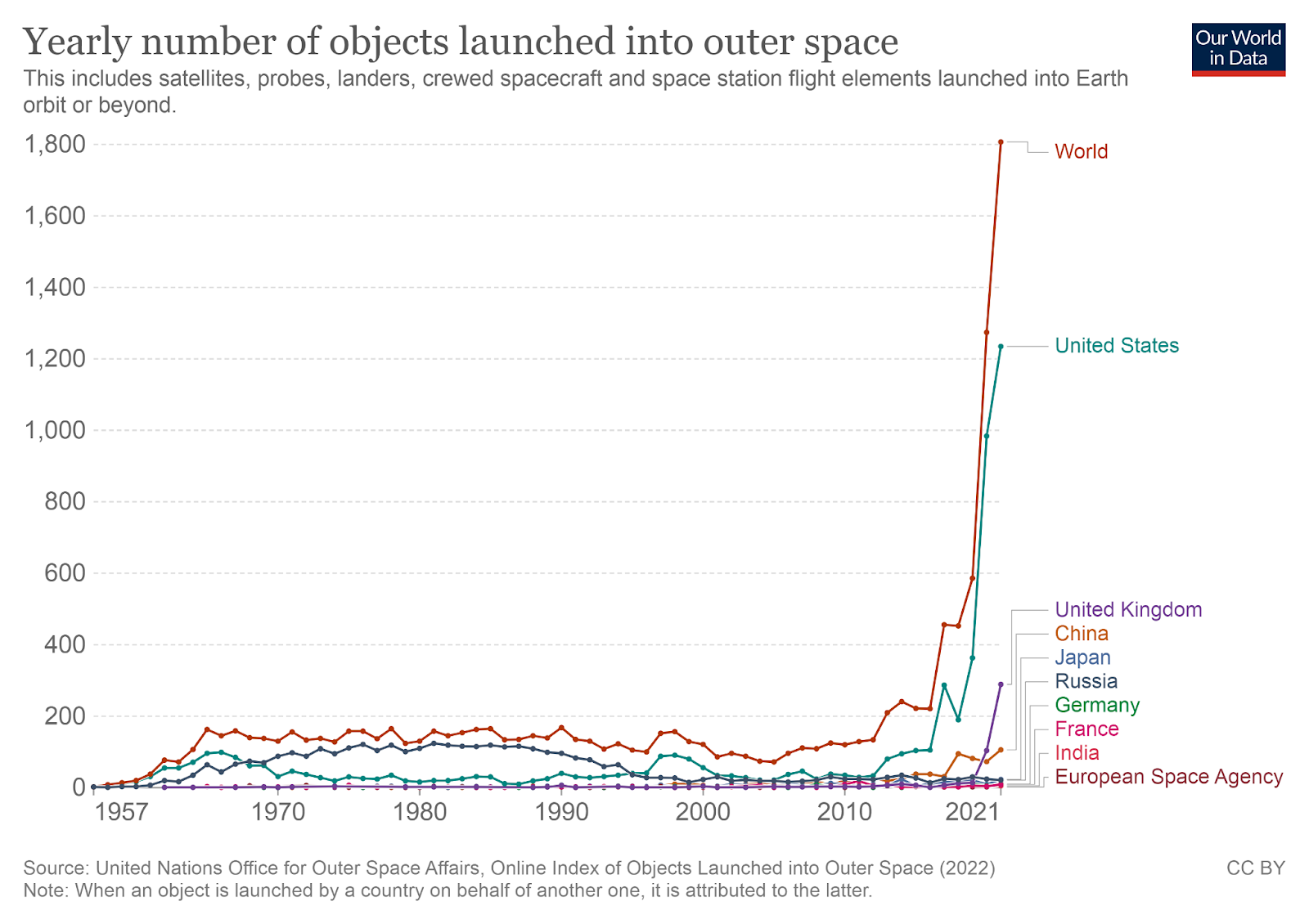This is an essay I wrote for the Eon Essay Contest.
“The Earth is the cradle of humanity, but [hu]mankind cannot stay in the cradle forever.”
KONSTANTIN TSIOLKOVSKY
The Space Race (1955-1975) between the United States and the USSR was primarily motivated by a race for achievement—the craving to display technological and intellectual superiority. Rivalry drawn from the Cold War and sparked by USSR’s launch of the first artificial satellite into space, the Space Race was an intense period resulting in great human progress. If I was a child witnessing the first man step foot on the Moon back then, I couldn’t have helped but imagine all the seemingly far-fetched endeavors humankind would have embraced and succeeded in doing so relating to space travel in the coming decades. If you’d have come from the future and told me in the year 1972 after I’d just witnessed 12 men walk on the Moon that the number of people who will have set foot on the Moon by the year 2022 would still be 12, and that no human will even have touched the surface of Mars by then, I would certainly not have believed you.
Yet, this was bound to happen. After the Space Race ended, humans regressed in their development of space technology. A look at the amount of money NASA was getting during and after the Space Race is shocking. During the competition, outrageous sums of money were allocated to the NASA federal budget relative to what usually should have been the case. (Perhaps this is what made President Kennedy so confident in his famous “We choose to go to the Moon” speech?):

The graph shows the preposterous amount of money NASA received as its budget during the Space Race, then we see the giant dip in it as the Space Race ended. (source)
After the Race ended, things got back to normal and Mars sure was out of question.
Though progress was slow after, we were still in the Space Age. Fairly so as we literally entered a new phase in technology. But recently that term needs to add another word before it as the impossible becomes the norm. The Commercial Space Age is here.

In recent years, as space has gotten commercialized, the number of objects people put into space per year has arisen exponentially. (source)
Efforts made by SpaceX, Blue Origin, Virgin Galactic, Boeing and the others have led to great advancements and allowed for cooperation with government agencies like NASA and the ESA. SpaceX is literally building a rocket to get people to Mars—it’s happening! In seemingly lesser extreme scenarios commercial space is winning still. Inevitably though, with commercialization of space comes deep political and territorial implications. Not to mention moral, scientific, and economical as well. With this an interesting set of problems arise as space becomes democratized and humans explore the vast realms of the cosmos. Problems that can have enormous effects for the whole of human civilization.
Problem #1: Space junk
There’s a ton of debris orbiting our Earth. Ever since the launch of the first artificial satellite into space, we have been sending out stuff to revolve around our planet at an ever increasing rate. And it seems we’ll keep increasing the number we pump out each year. Space junk is stuff we sent out that no longer serves a useful function. Like dead spacecraft, abandoned launch vehicle stages, tiny fragments of metal, or even paint flecks that are caused by orbital collisions with other stuff. Garbage disposal almost always requires a lot of mental effort. And there is a huge importance to do so, hence we go through the trouble. But removal of junk from space is supposedly harder than any garbage disposal system here on Earth. Scientists estimate there are more than 100,000 pieces of orbital debris between 1 cm and 10 cm. And tens of millions of pieces are smaller than 1 cm. And there are about 37,000 pieces of large debris (10cm+) as of May 2022 (source). Orbital speeds are so fast that being hit by debris the size of a pea would be like being hit by a bowling ball moving at 300 miles per hour.
The satellite network allows for global communication, GPS and navigation, weather data, looking out for asteroids and a lot more. Technology we definitely don’t want to lose. The most dangerous possibility is a collision cascading effect. If a satellite clashes with another one in the right manner, it will smash through the satellite and thousands of little pieces will be floating in orbit, ready to clash with other working satellites and destroy them. This may not only lead to most or all satellites being destroyed but it may also create a prison here on Earth not allowing us to send any other rockets up in space until we figure out how to clear up the mess. This is the worst case scenario but it’s very much possible. A few collisions and satellite damages don’t seem to matter but each one does. A single collision can create a ton of junk particles that can lead to even more collisions resulting in this exponential cascade effect.
Problem #2: Who owns real estate and resources in space?
The individual or organization that reaches the territory first? Someone who simply claims they own the land? The government? Who owns space in space? May explicit ownership lead to other parties wanting to conquer the same land for resources and territorial power? Do we need laws for space? (Turns out we do have a field called space law.)
Problem #3: Alien attack
“If aliens ever visit us, I think the outcome would be much as when Christopher Columbus first landed in America, which didn’t turn out very well for the Native Americans.”
STEPHEN HAWKING
I wonder if it is our human condition that fights wars, and destroys whole cities for parochial reasons that is the cause for the common assumption that aliens will be evil and we should be careful encountering them for they might as well kill us all and steal our resources. There is a whole philosophical debate behind this that I don’t want to delve into here but I don’t think it is likely at all that aliens will make us go extinct. For a civilization so intelligent that we come into contact with them, they must have progressed morally as well. And I don’t know of any reason why in the absurdly abundant universe they would want to steal our “resources”. Nevertheless, I may be wrong in my optimism. We would still need to take significant measures while entering into new relationships with alien species (if they happen to be out there in the vastness of the cosmos).
We must take the high road and think and choose in terms of the perspective of humanity, as Toby Ord puts it in his book The Precipice. In our scope of space exploration and the big threats that are posed with it, we must reach a place where we keep chances of something this terrible happening at a low minimum. This means investing and innovating in even those areas with very unlikely chances of existential catastrophe. We are already ideating technology to remove debris from space. One method is catching debris in space using a net. For tinier pieces of debris lasers might be the way to go. In terms of space real estate, we are creating treaties and space laws that would act as sort of the constitution of the universe. In doing so, we must give a lot of thought. We must not create a dogmatic system of any sorts.
Progress is essential for human survival. These are so-called problems which may pose existential implications for the sole reason that we haven’t progressed beyond a point that they no longer be of such extreme threat. In the 1900s tuberculosis (TB) was one of the most feared threats to the future of civilization. But now (though some are still suffering), it is on no one’s list of things that could potentially wipe out humanity. Science allowed us to advance and find out the cause and cure of the Great White Plague. In the last century people also thought we would run out of food for the increasing population and so mass-famine will be the end of human civilization. But then perhaps history’s most underrated important person, Norman Borlaug, who is credited with saving over a Billion people worldwide from starvation, deployed techniques to exponentially increase agricultural production (leading to the term Green Revolution). No one thinks we shall run out of food now. One thing is for sure. We cannot stand here as unaccountable human beings and just watch everything happen. We must interfere and steer the starship of humanity in a direction that allows for the safeguarding of our future potential. The biggest threat to humanity is ourselves if we do not solve the biggest threats that pose a risk to our existence.
It’s important to have a culture of criticism that allows for progress in a free society. At the same time, we need people with interest to be working on the pressing problems we face today. We are lucky to have great minds already working on removing debris from Earth-orbit, making regulations relating to space estate and resources, and pondering on making careful contact with alien civilizations.
We can save ourselves from a catastrophe at any time. Before it sparks up, before it scales to reach the wider world and before complete doom. Although it may be hard in the latter stages, we can still solve problems. Yet, it would be best to prevent the worst catastrophes to even spark up.
Bibliography
- How (and Why) SpaceX Will Colonize Mars — Wait But Why
- End of Space – Creating a Prison for Humanity
- As private satellites increase in number, what are the risks of the commercialization of space? — WEF
- Commercial use of space – Wikipedia
- Space debris – Wikipedia
